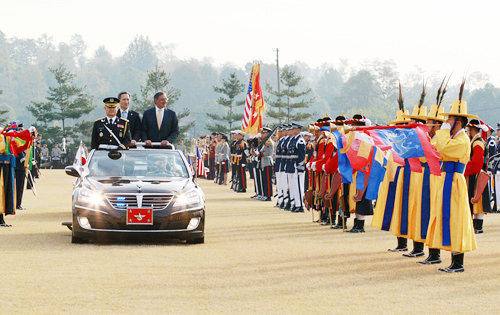|
 |
|
STRENGTHENED ALLIANCE: Visiting U.S. Defense Secretary Leon Panetta attends a welcoming ceremony with South Korean Defense Minister Kim Tae Young in Seoul on October 27 (XINHUA) |

North Korea and the United States completed a two-day round of talks in Geneva, Switzerland, on October 25. The talks were moving in a positive direction and differences were narrowed, said Stephen Bosworth, U.S. Special Representative for North Korea Policy. Despite this comment, the talks produced no concrete results.
Many changes have taken place on the Korean Peninsula since the September 19 Joint Statement was issued at the six-party talks in 2005. According to the joint statement, all parties should commit themselves to the principle that the Korean Peninsula should be denuclearized.
These changes have made it difficult for the implementation of the joint statement. Also, they have destroyed the political mutual trust between North Korea and South Korea, and between North Korea and the United States. Returning to talks presents substantial challenges to both the United States and North Korea.
Both sides adopted a cautious manner at the Geneva talks. This attitude shows both have a clear mind about the difficulties. In fact, although North Korea has been seeking talks with the United States and expressing its willingness to restore the six-party talks, the United States has responded indifferently. This is largely because of its extreme distrust of North Korea, which quit the six-party talks in April 2009.
This distrust comes from two aspects: One is the United States believes North Korea lacks sincerity on denuclearization; and the other is the United States regards North Korea's policy toward South Korea as aggressive.
The United States seems to have good reason for its doubt over North Korean sincerity on denuclearization. North Korea did not abandon its nuclear program after the September 19 Joint Statement was adopted, but conducted a second nuclear test in May 2009. It was the result of a series of complex issues, including disputes on how to verify the dismantlement of nuclear weapons, the deterioration of North-South Korean relations after South Korean President Lee Myung Bak took office in 2008, and the tough measures taken by the United States, Japan and South Korea to deal with North Korea's alleged test satellite launch in April 2009. But these issues could not change the nature of the second nuclear test as a violation of the September 19 Joint Statement.
North Korea has repeatedly denied carrying out a uranium enrichment program for years. But last November it presented its uranium enrichment equipment to U.S. experts.
In addition, tensions on the Korean Peninsula were exacerbated by the sinking of the South Korean warship Cheonan in March 2010 and the exchange of fire on the Yeonpyeong Island in November 2010.
Three days after the talks, on October 28, U.S. and South Korean defense chiefs held the 43rd U.S.-South Korean Security Consultative Meeting. The two sides issued a joint statement, pledging to complete a joint operational plan to deal with "North Korean aggression" and jointly develop a military deterrent to tackle nuclear and weapons of mass destruction threats from North Korea. U.S. Defense Secretary Leon Panetta expressed suspicions over North Korea's sincerity to abandon its nuclear program.
Once again we see the contradiction of U.S. policies. While having talks with North Korea, requiring North Korea to stop uranium enrichment to show its sincerity, the United States demonstrates strong military hostility against North Korea.
This serves as proof of the difficulties in the rebuilding of basic mutual trust, which is essential for negotiations between the two countries. Without big efforts, it is hard to overcome these difficulties.
The factors driving North Korea to agree to resume the six-party talks without conditions are complicated. The exchange of fire on the Yeonpyeong Island has led North Korea's confrontation with South Korea and the United States to a dead end. If this confrontation continues, the consequence can be dangerous. Neither the peninsula nor neighboring countries would like to see it happen.
| 